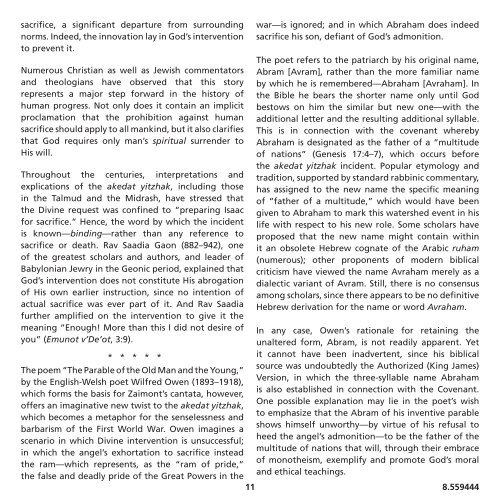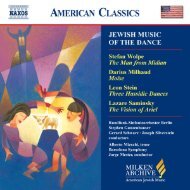Download Liner Notes PDF - Milken Archive of Jewish Music
Download Liner Notes PDF - Milken Archive of Jewish Music
Download Liner Notes PDF - Milken Archive of Jewish Music
You also want an ePaper? Increase the reach of your titles
YUMPU automatically turns print PDFs into web optimized ePapers that Google loves.
sacrifice, a significant departure from surroundingnorms. Indeed, the innovation lay in God’s interventionto prevent it.Numerous Christian as well as <strong>Jewish</strong> commentatorsand theologians have observed that this storyrepresents a major step forward in the history <strong>of</strong>human progress. Not only does it contain an implicitproclamation that the prohibition against humansacrifice should apply to all mankind, but it also clarifiesthat God requires only man’s spiritual surrender toHis will.Throughout the centuries, interpretations andexplications <strong>of</strong> the akedat yitzhak, including thosein the Talmud and the Midrash, have stressed thatthe Divine request was confined to “preparing Isaacfor sacrifice.” Hence, the word by which the incidentis known—binding—rather than any reference tosacrifice or death. Rav Saadia Gaon (882–942), one<strong>of</strong> the greatest scholars and authors, and leader <strong>of</strong>Babylonian Jewry in the Geonic period, explained thatGod’s intervention does not constitute His abrogation<strong>of</strong> His own earlier instruction, since no intention <strong>of</strong>actual sacrifice was ever part <strong>of</strong> it. And Rav Saadiafurther amplified on the intervention to give it themeaning “Enough! More than this I did not desire <strong>of</strong>you” (Emunot v’De’ot, 3:9).war—is ignored; and in which Abraham does indeedsacrifice his son, defiant <strong>of</strong> God’s admonition.The poet refers to the patriarch by his original name,Abram [Avram], rather than the more familiar nameby which he is remembered—Abraham [Avraham]. Inthe Bible he bears the shorter name only until Godbestows on him the similar but new one—with theadditional letter and the resulting additional syllable.This is in connection with the covenant wherebyAbraham is designated as the father <strong>of</strong> a “multitude<strong>of</strong> nations” (Genesis 17:4–7), which occurs beforethe akedat yitzhak incident. Popular etymology andtradition, supported by standard rabbinic commentary,has assigned to the new name the specific meaning<strong>of</strong> “father <strong>of</strong> a multitude,” which would have beengiven to Abraham to mark this watershed event in hislife with respect to his new role. Some scholars haveproposed that the new name might contain withinit an obsolete Hebrew cognate <strong>of</strong> the Arabic ruham(numerous); other proponents <strong>of</strong> modern biblicalcriticism have viewed the name Avraham merely as adialectic variant <strong>of</strong> Avram. Still, there is no consensusamong scholars, since there appears to be no definitiveHebrew derivation for the name or word Avraham.In any case, Owen’s rationale for retaining theunaltered form, Abram, is not readily apparent. Yet* * * * *it cannot have been inadvertent, since his biblicalsource was undoubtedly the Authorized (King James)The poem “The Parable <strong>of</strong> the Old Man and the Young,”Version, in which the three-syllable name Abrahamby the English-Welsh poet Wilfred Owen (1893–1918),is also established in connection with the Covenant.which forms the basis for Zaimont’s cantata, however,One possible explanation may lie in the poet’s wish<strong>of</strong>fers an imaginative new twist to the akedat yitzhak,to emphasize that the Abram <strong>of</strong> his inventive parablewhich becomes a metaphor for the senselessness andshows himself unworthy—by virtue <strong>of</strong> his refusal tobarbarism <strong>of</strong> the First World War. Owen imagines aheed the angel’s admonition—to be the father <strong>of</strong> thescenario in which Divine intervention is unsuccessful;multitude <strong>of</strong> nations that will, through their embracein which the angel’s exhortation to sacrifice instead<strong>of</strong> monotheism, exemplify and promote God’s moralthe ram—which represents, as the “ram <strong>of</strong> pride,”and ethical teachings.the false and deadly pride <strong>of</strong> the Great Powers in the11 8.559444
















